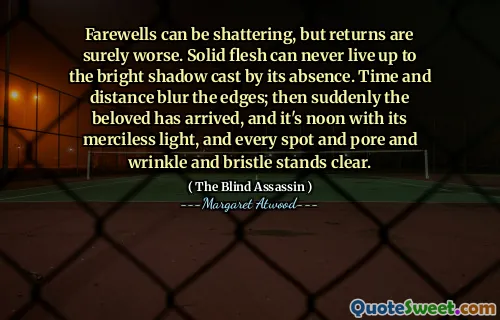There were a lot of gods. Gods always come in handy, they justify almost anything.
In "The Blind Assassin," Margaret Atwood presents a world filled with numerous deities that play a crucial role in shaping human behavior and societal norms. These gods serve as a powerful tool for individuals to rationalize their actions, providing a sense of authority and validation for decisions that might otherwise seem questionable. This notion reflects the broader theme of how belief systems impact morality and the human condition.
The idea that gods can justify almost any action emphasizes the complexity of truth and morality in the narrative. Characters often rely on these divine figures to navigate their moral dilemmas, illustrating how easily one can manipulate beliefs to serve personal agendas. Atwood’s exploration of this dynamic provokes readers to ponder the influence of mythology and belief on individual choices and societal standards.


